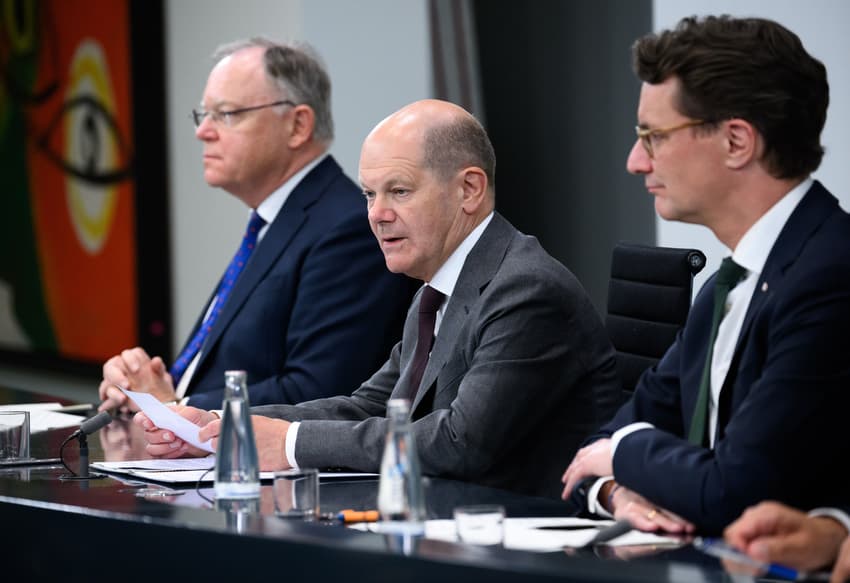Germany approves tougher migration measures

Chancellor Olaf Scholz and the heads of Germany's 16 states on Wednesday agreed on new measures to tackle soaring migration after crunch talks.
In the first four months of 2023, some 101,981 asylum applications were filed in Germany, an increase of 78 percent from the same period in 2022. Almost 218,000 applications were filed in Germany last year, the highest number since 2015-16, with the largest number of newcomers hailing from war-torn Syria and Afghanistan, followed by Turkey and Iraq.
In addition, more than a million people arrived from Ukraine in the wake of Russia's invasion of the country. In Wednesday's agreement, a modernisation of IT systems is due to help accelerate the processing of asylum applications, which currently takes 26 months on average, potentially speeding up the expulsions of those with unsuccessful bids.
An extension of the maximum detention period for migrants from 10 to 28 days was agreed to make it easier to order and maintain their detention before a possible expulsion.
Germany will also aim to reach "new migrant partnerships" with the countries of origin of the new arrivals, Scholz told a press conference.
READ ALSO: IN NUMBERS: Over one million Ukrainians fled to Germany in 2022
Scholz said the agreements would facilitate the arrival of "qualified staff" from the relevant nations in exchange for deals allowing the return of irregular migrants.
The federal government and the regions opted against implementing permanent border checks with neighbouring countries but refused to rule it out. Currently, Germany only applies fixed controls to everyone passing through along its border with Austria.
Referring to this arrangement, Scholz said "similar measures" would be taken with other neighbouring countries according to the situation.
Germany also borders Belgium, the Czech Republic, Denmark, France, Luxembourg, the Netherlands, Poland and Switzerland.
The reintroduction of border checks in the European Union's Schengen Area of free movement is permitted only in exceptional circumstances.
The government also committed to giving a further €1 billion to the states, with a working group to examine a long-term solution.
Regional leaders have long been demanding more help and money to cope with the new arrivals, with many being forced to build temporary shelters.
"Controlling and limiting irregular migration" is a priority for Germany, Scholz said. The recent influx of asylum seekers has coincided with a rise in support for the far-right AfD party, especially in ex-communist eastern Germany.
The anti-migrant party is currently polling at around 15 percent, compared with 10.3 percent in the last general election in 2021.
Comments
See Also
In the first four months of 2023, some 101,981 asylum applications were filed in Germany, an increase of 78 percent from the same period in 2022. Almost 218,000 applications were filed in Germany last year, the highest number since 2015-16, with the largest number of newcomers hailing from war-torn Syria and Afghanistan, followed by Turkey and Iraq.
In addition, more than a million people arrived from Ukraine in the wake of Russia's invasion of the country. In Wednesday's agreement, a modernisation of IT systems is due to help accelerate the processing of asylum applications, which currently takes 26 months on average, potentially speeding up the expulsions of those with unsuccessful bids.
An extension of the maximum detention period for migrants from 10 to 28 days was agreed to make it easier to order and maintain their detention before a possible expulsion.
Germany will also aim to reach "new migrant partnerships" with the countries of origin of the new arrivals, Scholz told a press conference.
READ ALSO: IN NUMBERS: Over one million Ukrainians fled to Germany in 2022
Scholz said the agreements would facilitate the arrival of "qualified staff" from the relevant nations in exchange for deals allowing the return of irregular migrants.
The federal government and the regions opted against implementing permanent border checks with neighbouring countries but refused to rule it out. Currently, Germany only applies fixed controls to everyone passing through along its border with Austria.
Referring to this arrangement, Scholz said "similar measures" would be taken with other neighbouring countries according to the situation.
Germany also borders Belgium, the Czech Republic, Denmark, France, Luxembourg, the Netherlands, Poland and Switzerland.
The reintroduction of border checks in the European Union's Schengen Area of free movement is permitted only in exceptional circumstances.
The government also committed to giving a further €1 billion to the states, with a working group to examine a long-term solution.
Regional leaders have long been demanding more help and money to cope with the new arrivals, with many being forced to build temporary shelters.
"Controlling and limiting irregular migration" is a priority for Germany, Scholz said. The recent influx of asylum seekers has coincided with a rise in support for the far-right AfD party, especially in ex-communist eastern Germany.
The anti-migrant party is currently polling at around 15 percent, compared with 10.3 percent in the last general election in 2021.
Join the conversation in our comments section below. Share your own views and experience and if you have a question or suggestion for our journalists then email us at [email protected].
Please keep comments civil, constructive and on topic – and make sure to read our terms of use before getting involved.
Please log in here to leave a comment.